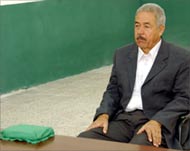Date set for Saddam’s Anfal trial
The trial of Saddam Hussein, the ousted Iraqi president, on charges including genocide in a campaign against Kurds in the 1980s has been set for August 21.

An estimated 100,000 people were killed in the Anfal campaign.
In a statement on Tuesday, the Iraqi High Tribunal said: “After the transfer of the investigation results of al-Anfal crimes to the criminal court… the tribunal decided on Monday August 21, 2006, as a trial date.”
The court had announced in April that Saddam and six co-defendants including Ali Hassan al-Majid, also known as Chemical Ali, would face genocide charges over the campaign.
A memo released by the tribunal in April said the campaign included “savage military attacks on civilians,” including “the use of mustard gas and nerve agents … to kill and maim rural villagers and to drive them out of their homes.”
Possible execution
Saddam and seven co-defendants are on trial for allegedly executing 148 inhabitants of the Shia village of Dujail after an assassination attempt there against Sadddam in 1982.
 |
|
Al-Majid, known as Chemical Ali, |
They face execution by hanging if convicted in the Dujail case, which is set to resume on July 10.
A US official has said a verdict could be issued by mid-September.
Iraq’s president, Jalal Talabani, himself a Kurd, has said that Saddam would be tried for all his crimes before any of the verdicts are implemented.
Chemical Ali is notorious for ordering the gassing of Halabja in 1988 which killed 5,000 people.
However, the Halabja case will not be included in the trial.
Others to be tried include the former minister of defence, Sultan Hashem Ahmed, and high-ranking Baathists Saber Abdel Aziz, Hussein Rashid al-Tikriti, Taher Mohammed al-Ani and Farhan al-Juburi.
A US official close to the court said in April that “the evidence that the court is going to look at involves voluminous amounts of documents, testimonies from a large number of victims and eyewitnesses and forensic evidence from mass graves that have been excavated.”
Genocidal act
Prosecutors have described the Anfal campaign as an act of genocide against the Kurdish people, while the former Iraqi government defended its actions as a necessary counter-insurgency operation during wartime.
Though estimates vary, it is believed at least 100,000 Kurds died during this period with more than 3,000 villages destroyed.
From 1987 to 1989, there were major attacks on the Kurds.
The gassing of Halabja in 1988 by Iraqi forces was in retaliation for the capture of the city by Kurdish peshmergas (warriors) backed by Iranian revolutionary guards and did not form part of the eight official Anfal campaigns.
The term “anfal” means spoils, and it involved bombardment, gassing and assault of parts of the Kurdish autonomous region in 1988.